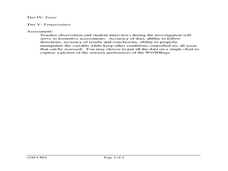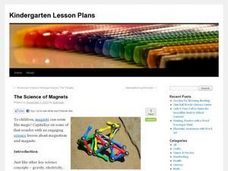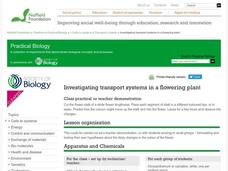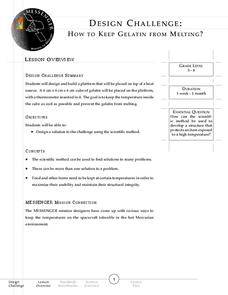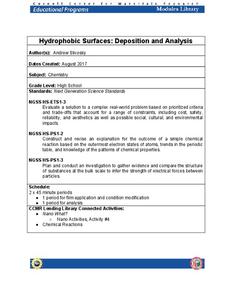Curated OER
Simple Rocket Science
Students demonstrate Newton's Third Law of Motion. They discuss the history of rockets, observe how a rocket works, and draw a picture and write an explanation of the balloon experiment.
Curated OER
The Nature of Science and Technology
Second graders perform a variety of experiments to observe, form conclusions, and make inferences. In this experiment lesson, 2nd graders experiment based on the result of a pre-assessment. Students share what they have learned.
Curated OER
Science Egg Experiment
Students examine and hypothesize about hard cooked and raw eggs before experimenting to see which one cracks more easily when dropped in a bucket. They open both eggs and compare them using a Venn diagram. They design a presentation...
Curated OER
The Science of Magnets
Students are introduced to the concept of magnetism and investigate the properties of magnets. In this magnetism lesson, students identify a magnet then examine why certain things are attracted to magnets and some things are repelled by...
Virginia Department of Education
Matter and Energy: Equations and Formulas
Using simple materials, an informative lesson demonstrates the Law of Conservation of Matter and explains how to balance chemical equations. Young chemists perform experiments, analyze reactions, and balance chemical equations...
Virginia Department of Education
Prokaryotes
Lead your biology class on a cell-sized adventure! Emerging scientists construct models of prokaryotes, then design an experiment to properly grow a bacterial culture. They conclude the activity by viewing the culture under a microscope....
Center for Learning in Action
Properties of Balls
Enhance your states of matter lessons with a hands-on science investigation that compares six different balls' color, texture, size, weight, ability to bounce, and buoyancy.
University of Colorado
The Jovian Basketball Hoop
Can you listen to Jupiter on a simple radio? Turns out the answer is yes! The resource instructs scholars to build a simple radio to pick up the radio waves created when the charged particles from the sun hit Jupiter's magnetic...
Chymist
Empirical Formula of a Compound
Because of the work of John Dalton, we are able to write formulas for compounds. The hands-on experiment has scholars prepare a compound from its elements. Using mass data, individuals write the empirical formula for the compound.
Nevada Outdoor School
Let It Snow! Let It Melt!
Winter weather offers a great opportunity to teach young scientists about the states of matter. This activity-based lesson includes a range of learning experiences, from experimenting with the rate at which ice melts...
Signing Time Foundation
What is the Water Cycle?
Dive into an exploration of the water cycle cycle with this simple earth science lesson plan. After first discussing where rain comes from, young scientists define the terms condensation, evaporation, transpiration,...
Institute of Electrical and Electronics Engineers
Wind Tunnel Testing
One of the factors that automotive engineers must consider is wind drag. The less wind drag, the more efficient the car will be. They perform many tests in wind tunnels, then refine their designs and test again. Using simple materials,...
BioEd Online
Good Stress for Your Body
Stress the importance of the different types of pressure our mind and body experience in a lesson about how certain types of stress are actually necessary and good for our bodies. As astronauts and people with injuries can attest, not...
TED-Ed
How Does Your Brain Respond to Pain?
Zap! Ouch! That hurts! But why? And how come people don't experience or respond to pain in the same way? Take a journey on the sensing pathway, from your nociceptors, along your nerves, up your spinal cord, to neurons and glial, through...
NOAA
Plate Tectonics II
Mid-ocean ridges, rift valleys, island arcs, mountain ranges, earthquakes, volcanoes ... there are so many features associated with plate tectonics. The 14th installment of a 23-part NOAA Enrichment in Marine sciences and Oceanography...
Nuffield Foundation
Investigating Transport Systems in a Flowering Plant
Some weddings have flowers in a unique, unnatural color to match the theme. Young scientists take part in this process to learn about the function of the xylem as they observe colored water moving through a flower. Then, they experiment...
Space Awareness
The Sun Compass of the Vikings
Evidence shows the Vikings likely navigated by using a simple sundial to find their course. Videos, a short story, and discussion help bring this time period to life as they study European history with a hands-on experiment. Scholars...
Serendip
How Do We Sense the Flavors of Food?
We taste with our taste buds, so why do flavors change when we have a stuffy nose? Scholars experiment with taste testing while holding their noses and then while smelling. They record their observations in pairs and come together to...
Messenger Education
Design Challenge: How to Keep Gelatin from Melting
The inside of the spacecraft Messenger, which explores Mercury, will experience temperatures from 32 to 91 degrees Fahrenheit. In the final installment of a series of four space-related activities, groups spend time discussing and...
Baylor College
Energy Sources
Take the concept of burning calories to a more literal level in the second of seven lessons about energy in the realm of food and fitness. Using simple materials, groups will burn breakfast cereal and a pecan to see which one gives off...
Curated OER
Sweet Science: How Sugar Molecules are Manipulated in Candy Making
Students investigate how heat affect sugar solutions. In this science instructional activity, students compare the sweetness of different types of sugars. They research the development of sugar and create a timeline.
Curated OER
Solar Electricity ~ The Colour Sensitivity of a Photovoltaic Cell
Teacher's notes, a materials list, detailed procedure, tips, and extension ideas are all included to make teaching this lesson on photovoltaic cells a sunny spot in your day! After some brief background reading, physical science...
Cornell University
Hydrophobic Surfaces—Deposition and Analysis
Couches, carpets, and even computer keyboards now advertise they are spill-resistant, but what does that mean? Scholars use physical and chemical methods to coat surfaces with thin films to test their hydrophobic properties. Then they...
Curated OER
Simple Machines - Graphics, Experiments, Animation
Twelfth graders display simple machines through the use of graphics, experiments, and animation. They apply problem solving and design and skills.

